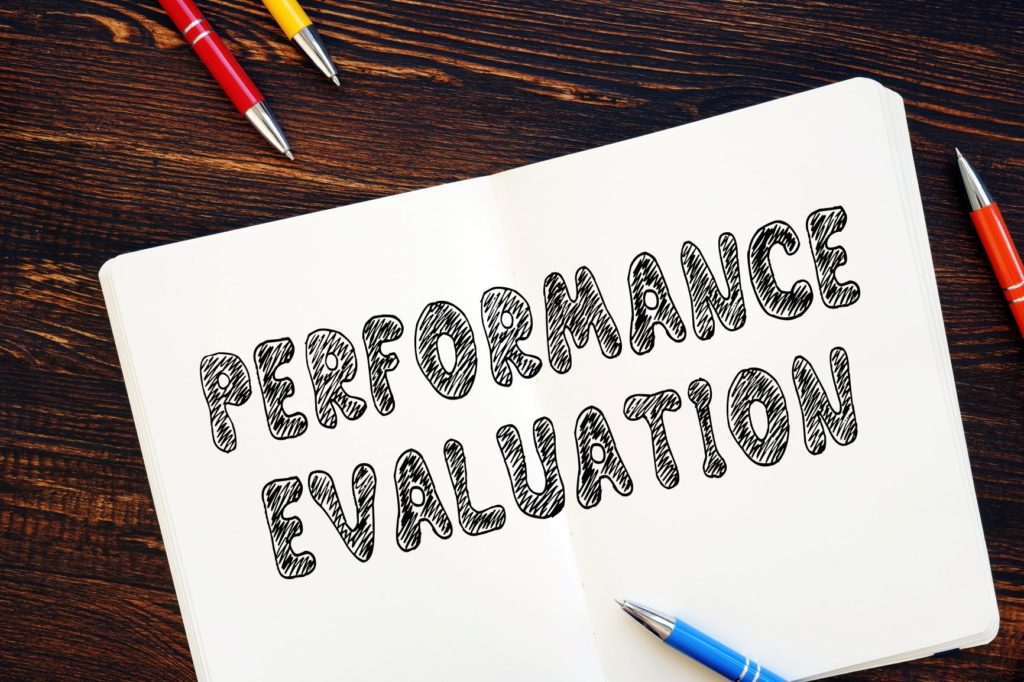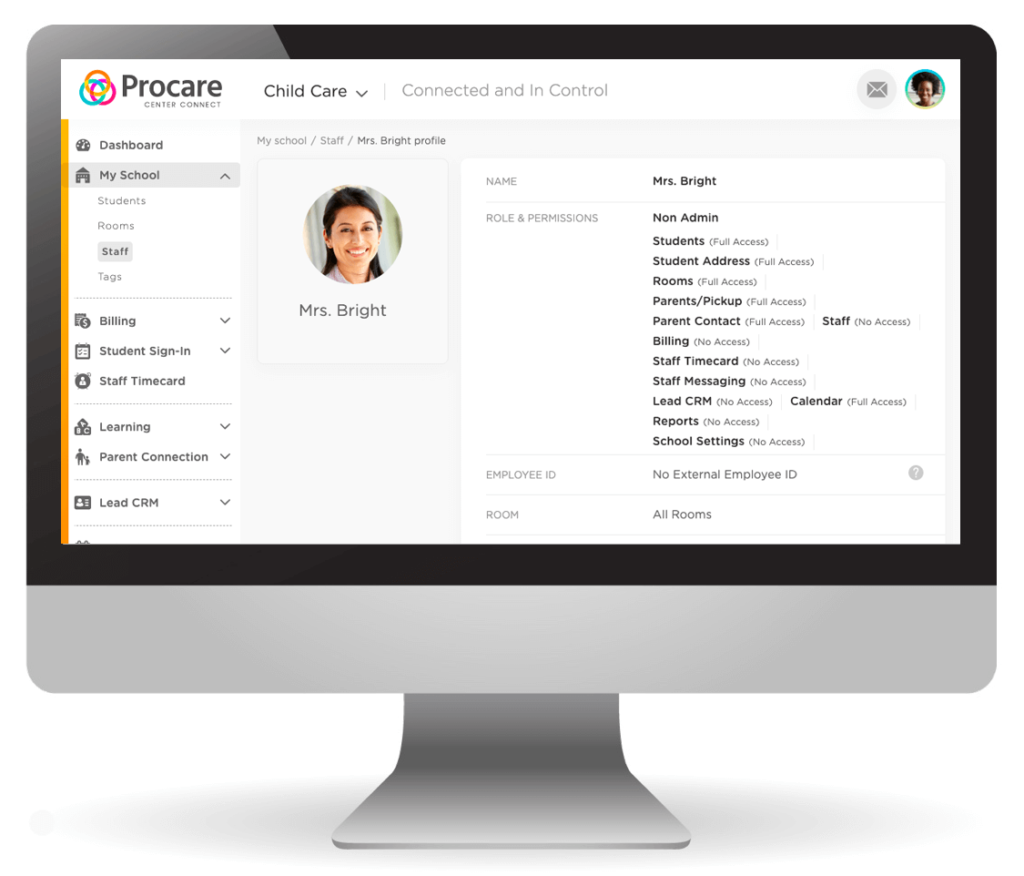
To help your child care staff perform at their full potential, it’s important to provide regular feedback. Your child care employees will shine when they know what is expected of them, what they’re doing well and where they need to improve. That way, they can plan their career development and understand how to do their best at every aspect of their job.
In this post, we’ll discuss everything you need to know about child care staff evaluation: what it’s for, why it’s important and what you’ll need to include. Then, we’ll share our tips and best practices for conducting these evaluations with staff members. Finally, check out our child care staff assessment form template at the end of the post — it’s a downloadable file optimized by our child care experts so you can save it, print it and modify it to the needs of your center.
What is a Child Care Staff Evaluation?
A child care staff evaluation is a regular procedure used to measure the performance of your employees in each aspect of their job. Child care staff evaluations create an opportunity for providers to reflect on their strengths and weaknesses, identify opportunities for improvement, and set goals to advance their personal and professional development. This procedure usually involves both a written evaluation and an in-person review.
Although job feedback can happen at any time in various contexts, it’s important to establish a process to provide regular and comprehensive evaluations to your employees, so that they can get a complete view of their performance. Evaluations should be done every 6-12 months to provide feedback, promote professional development and encourage improvement. Frequent evaluations help your staff set clear, measurable goals that they can act on based on your assessment.
Free Template
Child Care Staff Evaluation & Assessment
This free template helps ensure you cover all your bases when you review your child care staff’s performance.
What Belongs on a Child Care Staff Evaluation Form?

A clear, well-prioritized child care staff evaluation form is a valuable tool for managing your child care employees. With the right evaluation process, you’ll make performance reviews easier and less stressful, and your staff will get more out of your feedback.
We’ve identified six key sections that should be addressed on your center’s child care staff evaluation form. For each section, we’ll provide a short list of relevant skills and behaviors to be assessed. You can rate each skill on a scale of 1 to 5 (known as the Likert scale), based on the staff member’s proficiency and leadership ability in that area.
Employee Information
This first section won’t contain any skills to be rated, but including the right details here is key to providing the full context for each evaluation. Basic information to mention starts with:
- The name of the employee
- Their position at your center
- The date
- The name of the person doing the evaluation
Beyond these elementary facts, it’s a good idea to think about how you can provide context for the evaluation you’re about to provide. List the main responsibilities of the employee, so they will understand exactly what they’re being measured against. It also helps to add a brief explanation of the rating scale, to give the numbers meaning.
Professional Conduct Evaluation
Professional conduct refers to the expectations of behavior applied to all employees when it comes to taking their job seriously, dealing appropriately with coworkers and adhering to rules, ethics and professional standards. Rating items for this area can include:
- The staff member’s punctuality and attendance
- Is the staff member’s appearance and grooming appropriate?
- Do they maintain positive relationships with colleagues?
- Do they use work-appropriate language and communicate politely with others?
- Do they avoid gossip and personal conversations?
- Does the staff member embrace teamwork and contribute their fair share?
- The staff member’s adherence to professional ethical guidelines, such as confidentiality
- How well does the staff member deal with conflict and criticism?
Child Care Work Evaluation
In this section, you’ll cover the child care employee’s approach to working with children. This lets you review the level to which the employee is a caring, sensitive teacher who encourages the full potential of each child. Rating items to include for this section:
- How friendly and engaging is the staff member’s attitude toward children?
- Do they show respect for children’s individuality, promoting independence and self-esteem?
- Do they avoid use of labels and negative terms for children?
- Do they encourage good behavior and use appropriate discipline when necessary?
- How well do they engage with children, such as by joining kids on the floor?
- Do they document children’s progress and keep records?
- Is their communication with children developmentally appropriate and positive?
- Are they comfortable working with children who have special needs?
Parent Engagement Evaluation
Here you’ll discuss the employee’s effectiveness at building positive relationships with parents. Consider how well they communicate with families, their understanding of families’ needs and their sensitivity to individual circumstances. Rating items can include:
- Is the staff member a friendly, welcoming ambassador to families?
- Do they work effectively with parents to solve child care issues?
- Are parent communications clear, effective and timely?
- Do they navigate concerns and difficult conversations with tact and sensitivity?
- Are they a respectful and sympathetic listener?
- Do they make themselves available when needed by parents?
Classroom Skills Evaluation
This is the part of the evaluation where you can rate the staff member’s skills at managing the classroom and delivering educational activities. Lesson planning, classroom management, organization and effective use of time are all factors in this section. Include rating items such as:
- Do they develop and make full use of lesson plans in keeping with the curriculum?
- Are the classroom’s learning centers used effectively?
- Is the room prepared in advance daily and maintained in an orderly way?
- Are classroom activities developmentally appropriate?
- Do they use a variety of learning activities and materials?
- Do they plan ahead for potential interruptions and changes?
- Is there an established classroom routine?
- Do they provide a positive, nurturing environment?
Professional Development Evaluation
In the professional development evaluation, consider how the employee approaches their job as part of their overall career goals. You’ll want to look at their commitment to continuing education, their change advocacy and their self-improvement skills. Questions to ask include:
- Does the employee take any classes or seek new qualifications in child care or other areas that could be of use at the center?
- Do they seek opportunities to improve and try new things?
- Are there any mentorship relationships between the staff member and other employees?
- Do they find ways to contribute to the center outside their main job duties?
- Do they set appropriate career and self-improvement goals?
5 Simple Best Practices for Child Care Staff Evaluations

- Ask Your Staff to Self-Evaluate. Your staff members’ perspective on their own work is as important as yours. Giving your employees the opportunity to evaluate themselves lets them reflect on their own work and identify their strengths and weaknesses, while giving you insight into their approach to work.
- Schedule a One-on-One Meeting to Review the Staff Evaluation Form. Staff evaluations are a two-way conversation, and employees should be given every opportunity to respond to feedback and seek guidance. A one-on-one meeting opens the door for staff to have their voices heard with you turning the evaluation form into a living document that reflects the concerns and needs of both employer and employee.
- Identify Opportunities for Improvement. Simply noting strengths and weaknesses is helpful for employees to understand their performance, but to make your reviews most effective, work with your employees to plan next steps. Every staff member’s individual challenges open a door for them to learn and grow as an educator, and for you to help your staff reach their full potential.
- Set SMART Goals. SMART goals are goals that are Specific, Measurable, Achievable, Realistic and Timely. Regular performance reviews allow you to set clear, objective goals for your staff that can be achieved within a set timeframe. SMART goals let you translate your employee standards into actionable items in which your staff can easily measure their progress.
- Revisit Past Evaluations to Assess Staff Development. Looking at past reviews at each evaluation lets you get the big picture of your staff’s growth and change over time. This way, rather than taking an out-of-context snapshot, you’ll be able to ensure that each staff member is on a positive trend.
Manage Your Child Care Staff with Procare Solutions

Your staff members form the heart of your child care business, and you want to do everything you can to help make them the best educators they can be. Procare’s trusted all-in-one child care app gives you all the tools you need to manage every part of your child care center, from staffing to security, with the support of our expert community.
With comprehensive staff management features, you’ll save time on tasks like payroll and scheduling, while easily monitoring staff-to-child ratios. Our leading parent engagement platform empowers your staff to send engaging real-time updates to parents, and supports classroom management activities like recordkeeping.
Want to learn how Procare can make managing staff at your child care center as easy as ABC?




